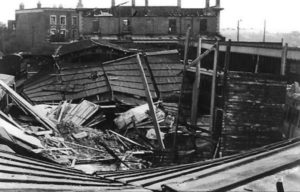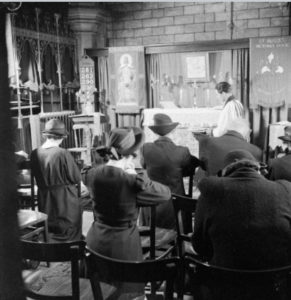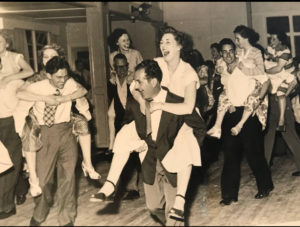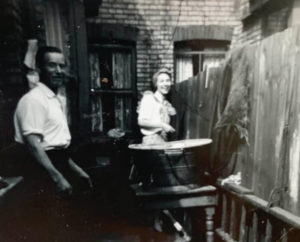First hand account of Black Saturday and beyond – and memories of wartime North Woolwich and Silvertown
VIVID memories of Black Saturday, wartime life and beyond in North Woolwich and Silvertown were unearthed by me this week.
The eyewitness account also reveals how most people in the rest of East London thought the area had been completely destroyed in the horrific bombing attacks 84 years ago.
The discovery came in a New Year clean up and clear out of my loft…
Among the possessions that I have kept for ten years of my aunt Julia Myers, who lived in North Woolwich, I found her handwritten story about Black Saturday and what happened in the years after.
Jill, as she was known to friends and family, passed away ten years ago. She married and became Jill Kaye and after being widowed later married again and became Jill Sidoli.
Black Saturday came when 348 German bombers, accompanied by 617 fighter planes attacked London on Saturday September 7, 1940. Around 1,000 bombs and other incendiary devices were dropped on strategically important areas like The Royal Docks. One hundred and forty six people were killed in East and West Ham alone, with the death toll across London reaching close to 500 in one night of bombing.
- Jill pictured, left in front row in 1938, two years before Black Saturday at Elizabeth Street School, North Woolwich, with the netball team
Eight years ago I wrote a feature from another piece penned by Jill about her evacuation experiences. (Vivid recollections of wartime evacuation…drama and tears | Colin Grainger (colin-grainger.co.uk)_
While sorting the loft I came across her latest memories, secreted inside a photo album.
- Jill’s handwritten memories
They began when the decision was made for Jill and sister Lily (my mother) to return to North Woolwich from their evacuation to Warminster, Wiltshire.
The Second World War began just three days after they had been evacuated.
“After a year there I had reached the age of 14 and it was decided I would go back t0 London to work,” wrote Jill.
“My headmaster in Wiltshire was against it, but I had to go. He said London hadn’t had any bombing yet but it would start soon. He was so right.”
Jill went home in August 1940 and applied to STC (Standard Telephones and Cables) for a job. Just under two weeks later she was offered a position as a ‘mail girl,’ with a view to going into the company’s typing pool to train as a typist.
“On Saturday September 7, it was a beautiful day. The sun was shining and my mother Judith and I were (planning) going shopping in East Ham. We were having a cup of tea in the backyard, sitting by our Anderson Shelter when we heard such a roar of planes overhead. My father Fred looked up and said: ‘Get into the shelter, they are German bombers!’
“We were in that shelter at 5pm on the Saturday evening and did not come out until 7am on Sunday morning , ” said Jill.
“It was a terrible night with bombs falling all along the River Thames, all our docks and shops and our railway stations were alight, along with all the factories.
- The damage caused to North Woolwich station on Black Saturday
“When we came up into the light, we had no windows, no gas or water and fires were burning everywhere. People trying to get to North Woolwich and Silvertown from Canning Town, Custom House or (South) Woolwich were not allowed in.
“We found out in the days to come that people all over were told that North Woolwich and Silvertown ‘had gone’ and there was nothing left, and there was no one alive.
“But the stories were wrong. We were very much alive and we were just busy clearing and cleaning up as quickly as we could.”
Jill said the bombing went on for quite a while and a routine quickly developed.
- Life continued at St Mark’s Church, Silvertown, despite the bombs dropping
“It was go to work, arrive home, get down into the shelter and have your dinner down there and get into your bunk to either read or go to sleep. The only light we had was candles or a torch to see by,” she wrote.
By now, Jill was employed as a typist from 8.30am until 5.30pm Monday to Friday and from 9am to 12pm Saturdays.
Believe it or not, said Jill: “It was a happy time despite planes frequently flying overhead so often.
“When the Air Raid Warning went out we had to carry on working until our lookout on the site on the roof spotted the planes and then told us over the tannoys: ‘Take Cover, Take Cover.’ Then we dived under our desks with our gas masks on until he sounded the ‘All Clear’ message.
“We had to carry our gas masks everywhere. But life was not all bad. We had dances at St Barnabas Church, West Silvertown, and had a club there where we would play table tennis and such like.
“We had dances in the Tate & Lyle canteen in Silvertown and in the Tate Institute opposite. And also at St John’s Church Hall in Pier Road, North Woolwich.
“They were joyous occasions that have stayed in my memory to this day.”
- Jill and friends pictured at one of the Tate Institute dances
Jill continued: “Following a night of bombing at the church, we spent Christmas night under The Arches at Silvertown. We were amazed that Conrad Veidt, the German-British actor, came to visit and met local young people. It was a lovely party.”
Jill explained that the family’s Anderson Shelter was very damp and condensation ran down the walls.
“Our next door neighbour decided she was going to get a Morrison Shelter, which went indoors. It was iron with mesh sides.
“This was to be for herself, my mother and sister and me . All the rest of our family were in the ARP. We went inside one night and thought it was horrendous. You had to crawl in and lay flat. Not for us.”
So Jill decided to become an ARP Messenger. She was too young to become a warden.
“I had to go around and make sure lights were not showing, and if phones were down in various depots, you had to take messages by hand to other depots. Some times you were out all night…but you still went to work the next day!”
It was a dangerous job for a young girl, but one Jill relished.
To Jill and her generation, it was just “what you did.”
The epitome of Keep Calm and Carry On.
- Jill in the backyard of the family home in Auberon Street , North Woolwich with father Fred
- Jill in later years with myself and (right) on a trip back to Warminster and Wiltshire where was was evacuated.
********* Pictures: Colin Grainger/ Newham Archives and Local Studies/ Imperial War Museum










